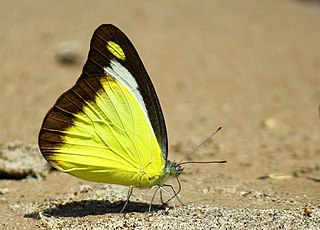
Appias lyncida, the chocolate albatross, is a butterfly of the family Pieridae, that is, the yellows and whites, which is found in south and southeast Asia.

Appias nero, the orange albatross, is a butterfly of the family Pieridae, that is, the yellows and whites. The species occurs from northern India to the Sunda Islands, the Philippines, Sulawesi and eastwards. Subspecies Appias nero galba is found in India.
The Palawano languages are spoken in the province of Palawan in the Philippines, by the Palawano people.

Saletara liberia is a butterfly of the family Pieridae. It is found in Indonesia, the Philippines, Peninsular Malaysia and various islands in the region. Subspecies S. l. distanti is known by the common name Malaysian albatross.
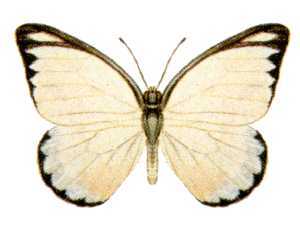
Appias ada, the rare albatross, is a butterfly of the family Pieridae. It is found on the Moluccas, New Guinea, Indonesia, Australia and the Solomon Islands.
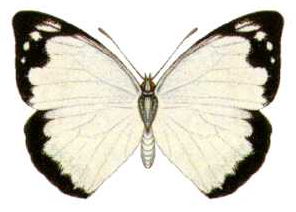
Appias paulina, the common albatross, Christmas Island white or Ceylon lesser albatross, is a butterfly of the family Pieridae. It is found from India to Samoa, including Indonesia, Japan, Malaysia, New Caledonia, Sri Lanka, Thailand and Australia.

Cepora judith, the Orange Gull, is a butterfly of the family Pieridae. It has no common name, although a subspecies is referred to as the orange gull. It is found in south-eastern Asia.

Appias sabina, the Sabine albatross or albatross white, is a butterfly of the family Pieridae. It is found in Africa. The habitat consists of forests.

Appias epaphia, the diverse white or African albatross, is a butterfly of the family Pieridae. It is found in Africa, south of the Sahara. The habitat consists of forests and heavy woodland.
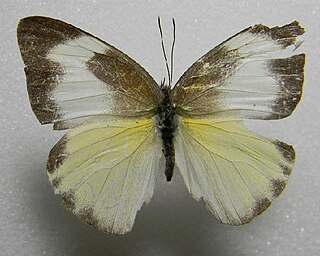
Appias drusilla, the Florida white or tropical white, is a butterfly in the family Pieridae. It is found in tropical America from Brazil north to southern peninsular Florida and the Florida Keys and Antilles. It frequently visits coastal Texas and is a rare stray to Nebraska and Colorado. The habitat consists of tropical lowland evergreen or semideciduous forests.

Saletara is a genus of butterflies in the family Pieridae.
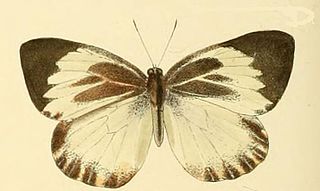
Phrissura is a genus of butterflies in the family Pieridae. The genus is monotypic containing the single species Phrissura aegis.
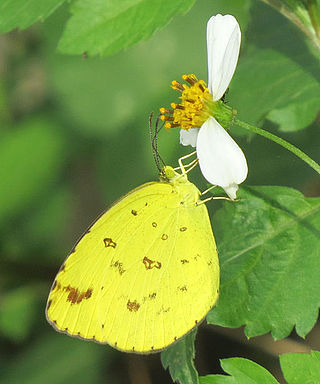
Eurema sari, the chocolate grass yellow, is a butterfly in the family Pieridae. It is found in Southeast Asia.

Eurema simulatrix, the changeable grass yellow, is a butterfly in the family Pieridae. It is found from Burma to Sundaland, Cambodia and the Philippines. The habitat consists of secondary or disturbed habitats including forest clearings, roadsides and riverbanks, parks and gardens.
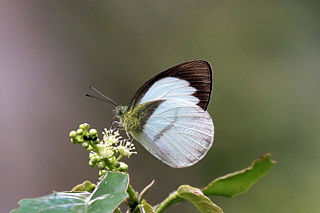
Appias aegis, the forest white, is a butterfly in the family Pieridae. It is found in south-east Asia.

Appias nephele is a species of pierine butterfly endemic to the Philippines.

The Sunda leopard cat is a small wild cat species native to the Sundaland islands of Java, Bali, Borneo, Sumatra and the Philippines that is considered distinct from the leopard cat occurring in mainland South and Southeast Asia.

Appias lalassis, the Burmese Puffin, is a butterfly in the family Pieridae.It was described by Henley Grose-Smith in 1887. It is found in the Indomalayan realm.
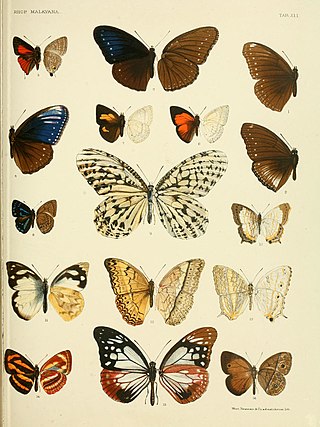
Appias pandione is a butterfly in the family Pieridae. It was described by Carl Geyer in 1832. It is found in the Indomalayan realm.
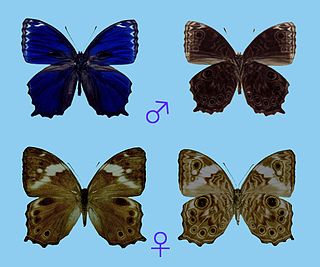
Ptychandra is a butterfly genus in the subfamily Satyrinae within the family Nymphalidae. Ptychandra was first described by Cajetan Felder and Rudolf Felder in 1861. The genus comprises eight species, seven found in the Philippines with an additional species found on the island of Borneo. It is remarkable for the fact that it is one of a few genera to have undergone evolutionary radiation in the Philippine archipelago, with most other species being migrants from the Asian mainland.



















